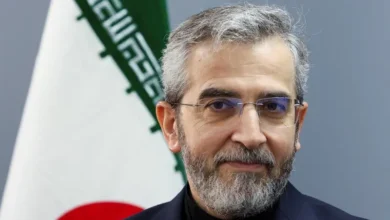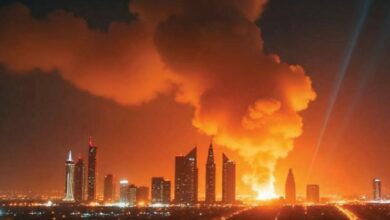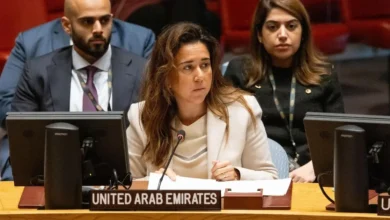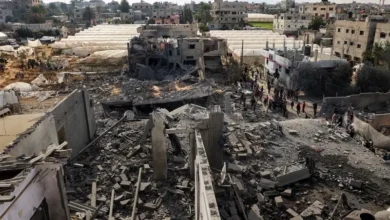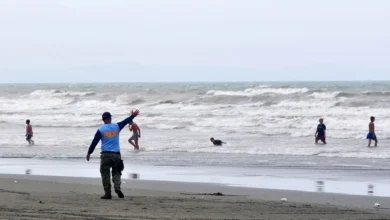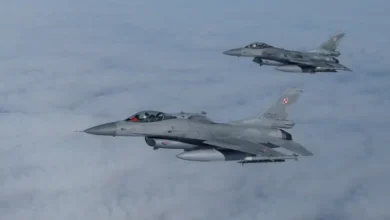Lebanon’s Hezbollah hits Israel’s Haifa with ‘biggest’ rocket attack
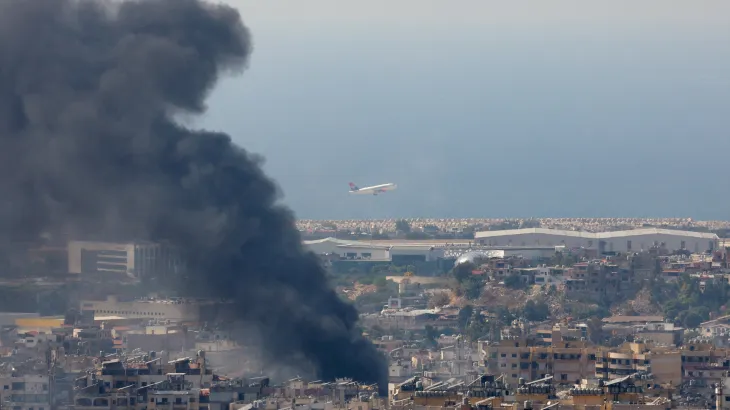
‘Very hard not to conclude’ Israel deliberately killing Gaza journalists
At least 175 media workers have been killed in Gaza in the past year – a figure described as an “absolutely shocking level of loss of life” by Tim Dawson of the International Federation of Journalists.
“The toll paid by journalists in Gaza is something the world has no prior experience of. Well over 10 percent of journalists in Gaza have lost their lives since this conflict began,” Dawson told Al Jazeera.
In past conflict zones, the average death rate for infantry soldiers was 5 percent, he noted, adding the figure for US Marines killed in Vietnam was less than 5 percent.
In Israel’s killing of Gaza’s media workers it’s “very hard not to conclude” these were deliberate actions, said Dawson.
“What is most important now is for the International Criminal Court to intensify its investigation … What we need is judicial review of the evidence and a holding to account, where necessary, of those who perpetrated war crimes.”
Dozens of bodies on Jabalia’s streets with heavy combat ongoing
Fierce fighting is taking place in northern Gaza as Palestinian soldiers battle Israeli troops after the launched another deadly ground incursion.
Dozens of bodies reportedly line the narrow allies of the Jabalia refugee camp as medical teams are unable to reach them.
Qassam Brigades, Hamas’ armed wing, said one Israeli soldier was killed in close-quarter combat “and immediately upon the arrival of the rescue force, its members were targeted with an anti-personnel ‘thunder’ bomb, killing and wounding them” in the al-Tawam area, northwest of Gaza City.
The Israeli military said it killed about 20 Palestinian fighters in air strikes and street battles in Jabali. At least seven civilians, including women and children, were also killed in the besieged camp, sources from the nearby Kamal Adwan Hospital said.
Teacher continues lessons amid destruction in Khan Younis
Eight-five percent of Gaza’s schools have been damaged or destroyed, and all universities have been demolished.
Israa Abu Mustafa is a Palestinian teacher who has built a classroom in the ruins of her house in Gaza’s southern city of Khan Younis.
The teacher says she wants to help displaced children continue their education, despite the destruction of their schools.
Al Jazeera’s Tareq Abu Azzoum reports from Khan Younis:
‘A tragedy that will unfold in the years ahead’
Israel’s relentless bombardment of Gaza has unleashed yet another deadly, but silent enemy on the people there – asbestos.
A mineral that poses little risk to humans when undisturbed but that is highly carcinogenic when dispersed and released into the atmosphere, asbestos is present throughout much of Gaza’s structures.
Over the past year, Israel’s bombs have caused vast amounts of it to be broken into tiny, airborne particles, which can potentially cause cancer in those who breathe it in, leading experts to say cases of cancer will likely be reported “for decades” in Gaza.
Qassam Brigades claims killing of Israeli troops in northwest Gaza
The armed wing of Hamas has said its fighters killed in close combat a soldier in the Gaza Strip’s at-Twam area.
The Israeli forces who came to rescue the soldier were subsequently targeted with an antipersonnel bomb, it said on Telegram.
The group added more soldiers were killed and wounded in the bomb attack, without giving any numbers.
There was no immediate comment by the Israeli army.
Israeli forces recently launched a new operation in northern Gaza despite the army’s statement in January that Hamas had been “dismantled” there.
WHO warns of possible disease outbreaks in Lebanon
A World Health Organization official says outbreaks might occur due to crowded conditions in displacement shelters and hospital closures.
“We are facing a situation where there is a much higher risk of disease outbreaks, such as acute watery diarrhoea, hepatitis A, and a number of vaccine-preventable diseases,” WHO’s Ian Clarke, deputy incident manager for Lebanon, told a Geneva news conference by videolink from Beirut.
The UN health agency has already warned that the system is overstretched and so far five hospitals in the country have closed and four are only partly functional, Clarke said.
He added that hospitals had been shut because medics had either fled the fighting or been asked to evacuate by Lebanese authorities.
Israeli forces have begun ground operations in the southwest of Lebanon, escalating a yearlong conflict with the Iran-backed group Hezbollah that has killed more than 1,000 people in the past two weeks and triggered a mass flight.
